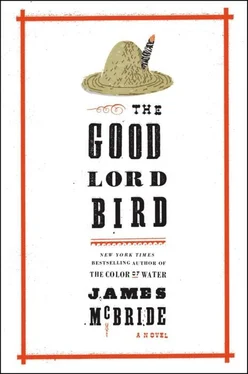The Captain smirked. “The ferries are run by Pro Slavers, son. They don’t take Yanks.”
Owen brandished his sword and pistols, nodding at the men behind us, three on horses and the rest on wagons, all armed. “They’ll take us.”
The Old Man smirked. “Did Jesus take a chariot down Jericho Road from eight thousand feet to sea level? Did Moses circle the mountain with the scroll of the commandments on a horse? Or did he climb the swell with his own feet? We shall march to Iowa as cavalry, like David of old.” Truth is, though, he couldn’t take the ferry ’cause he was on the run. The price on the Old Man’s head had gone up considerable in the two years since I’d been in Pikesville. Owen told me both Missouri and Kansas Territory had different prices on his head, and the folks back east had been stirred up considerable by their hearing of the Old Man’s doings, which included removin’ the head of Doyle and them others, not to mention freeing slaves wherever he went. Each week the Old Man sent one of his men to the nearby town of Cuddyville to get newspapers from back east, and them accounts was filled with all kinds of debates about the slave fight, not to mention the various wonderings about the prices on his head from various pickets, both territories, and Washington, D.C. To make matters worse, a federal company picked up our trail outside Nebraska City and chased us north, away from the ferry. They hung on through the snowstorm. We tried to ride away from them, but they hung back several miles, just out of sight. Each time we thought we’d lost them, the Old Man stopped and peered back through his looking glass and spotted them a few miles distant, struggling to keep up with us in the snow. This went on for days.
“Whyn’t they just come on and make a fight of it,” Owen murmured.
“They ain’t gonna do that,” the Captain said. “For Gideon told the people, ‘I will not rule over you. My son will not rule over you. The Lord will rule over you.’ Our Savior won’t let ’em fight us.”
After another three days of snow and freezing weather, the federals got tired of the game. They sent a horseman over to our camp bearing a white flag to speak to the Old Man. He was a rangy feller, with his uniform tucked neatly into his boots and his face beet-red from the cold. “I’m Lieutenant Beers,” he announced. “I brings words from my commander, Captain Haywood. He says if you was to come in quietly and not resist, we will take you to Lawrence for a fair trial and leave your men alone.”
The Old Man snorted. “Tell Captain Haywood to come and get me.”
“He’ll have to arrest you.”
“For what?”
“I ain’t certain of the charges, Captain,” the lieutenant said, “but the governor of Kansas Territory throwed a three-thousand-dollar price for your capture. President Buchanan has offered another two hundred fifty. You’d be safer with us than riding these parts with all that money hanging on your head.”
Sitting on his horse in the falling snow, the Old Man laughed. He had the oddest laugh of any man I ever saw. He didn’t make a sound, but rather crinkled his face and sucked in his breath. His shoulders heaved, he sucked in air, his face tightened up, and the wrinkles in his forehead would collapse around his eyes till they disappeared and all you could see was his yellow teeth, about to whoosh air out at you from what seemed like just about every hole in his head—his eyes, ears, and mouth. The overall effect was terrifying if you didn’t know him. The lieutenant got right unsettled watching it, and at that particular moment the Old Man sneezed, which flipped his body off his saddle for a moment and sent his frock coat tails flipping up, showing the handles of one of them great, big seven-shooters he carried in holsters on either side.
“That’s an insult,” the Old Man finally snorted when he was done. “I am fighting the cause in the name of our Holy Redeemer, who can expunge the word of any nation with a mere cough. I ain’t ruled by him. Deuteronomy thirty-two, thirty-five, says, ‘Their foot shall slide in due time.’”
He turned around and said to his men, “I herebys offer any man in this here army two dollars and fifty cents for President Buchanan’s head. He is presiding over a barbaric institution that does not answer to the throne of our most Holy Martyr.”
The soldier turned around and rode back to his company in a hurry. After a day, the federals rode off, tumbling through the deep snowdrifts and long ridges of the prairie. “A wise move,” the Old Man murmured, watching them leave through his peering glass. “They knows I have friends in high places.”
“Where?” snorted Owen.
“Our most high God, son, whose call you’d do well to heed yourself.”
Owen shrugged and didn’t pay him no mind. He and his brothers was used to the Old Man’s proclamations. Most weren’t nearly as religious as their Pa. In fact, when the Old Man was out of earshot, his sons gived full lip service to quitting the slave-fighting game altogether and returning to their homesteads. A couple of ’em, Jason and John, had already went and done it; they had enough living on the prairie the two years I was gone and quit and gone home, back to upstate New York, and most of his original crew from Kansas went home or was deadened. But he still had four sons with him, Watson, Oliver, Salmon, and Owen, plus he’d picked up some new men in his travels, and these fellers weren’t like his earlier crew, which was mostly Kansas farmers, homesteaders, and Indians. This new batch of fellers was young gunfighters, rough adventurers, teachers and scholars, serious business, and would shoot the hair off your head. The most serious of ’em was Kagi, a smooth-faced drummer out of Nebraska City who’d come to Pikesville with Owen. Kagi fought at Black Jack with the Old Man, but I hadn’t seen him there, being that my head was in the sand at the time. He was a schoolteacher by trade, and carried lectures and readings in a rolled-up paper bunch in his pocket, which he referred to from time to time. He seemed temperate enough, but he was wanted in Tecumseh for pulling out his Colt and throwing enough lead at a Pro Slavery judge to knock his face off and put the feller to sleep forever. The judge shot Kagi in the heart before Kagi deadened him. Kagi claimed the judge’s ball was stopped from piercing his heart by a notebook he carried in his breast pocket. He kept that ragged notebook on his person for the rest of his life, which it turned out weren’t very long. Next to him was John Cook, Richard Hinton, Richard Realf, a colored named Richard Richardson, and Aaron Stevens. The last was a tall, hulking grouse, a bad-tempered feller, well over six hands tall, dangerous business, always spoiling for a fight. He weren’t religious in the least. These fellers weren’t like the Old Man’s earlier crew of farmers fighting for their land. They didn’t smoke nor drink nor chew tobacco. They mostly read books and argued about politics and spiritual matters. The Old Man referred to ’em as “Mister This” and “Mister That,” and had the aim of converting ’em to the Holy Word. He overthrowed ’em with God every chance he got, saying, “Mister So and So, you’re doing the devil’s work making light of God’s salvation,” but they’d become used to ignoring him on that affair. Slavery was the question. That’s what bonded ’em. And they wasn’t fooling.
They followed him like sheep, though. Smart as they was, nary a one of ’em challenged him on his orders or even knowed where we was going from day to day. The Old Man was stone-cold silent on his plans, and they trusted his word. Only thing he allowed was, “We going east, men. We are going east to fight the war against slavery.”
Well, there is a lot of east. And there is a lot of slavery. And it is one thing to say you is gonna fight slavery and ride east to do it and take the war all the way to Africa and so forth. It is another to keep riding day after day in the cold to do it.
Читать дальше












